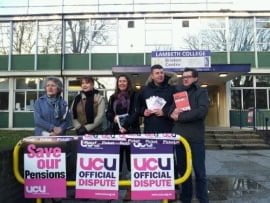The ongoing dispute at Lambeth College in London is emblematic of the entire austerity and privatisation programme. The militancy of the struggle against attacks on terms and conditions at Lambeth College and the closure of the Brixton site could in turn be an important point of reference in the struggle against austerity in general.
The ongoing dispute at Lambeth College in London is emblematic of the entire austerity and privatisation programme. The militancy of the struggle against attacks on terms and conditions at Lambeth College and the closure of the Brixton site could in turn be an important point of reference in the struggle against austerity in general.
Taking advantage of a poor Ofsted report, the hugely overpaid Principal Mark Silverman plans to launch an all-out offensive on the terms and conditions of staff, including the drastic reduction of sick pay, reduction in notice given for redundancies, reduction in annual leave and longer hours. The latter three changes strongly imply a coming wave of redundancies, especially as this plan coincides with one to close the important Brixton site of the Further Education (FE) college. These plans are an attack on the working class – both those who work there and who are taught there. It is essential the plan is fought militantly.
This need for unity and militancy is understood by the staff organised in both UCU and Unison. The first strike took place on 1st April, and 95% of UCU members voted YES in a 70% turnout for indefinite strike action. Unison members voted 83% YES for action. This is exactly the unity and militancy that will be needed to force back a plan which has the weight of the government’s austerity programme behind it. This was proven when, just before this indefinite strike was to go ahead on 1st May, a court injunction against the strike was passed, and thus strike action has been curtailed and delayed.
Now, in late May, another planned strike has been delayed, most likely until 2nd June. Under what pretext was the original all-out strike called off, given such a huge amount of support for action? Officially, it was because the ballot papers didn’t specifically state that the new contracts on worse conditions were for new workers. Not only is this irrelevant – the workers at Lambeth know what the plan is about and have overwhelming expressed their desire to strike – but it is not necessarily even relevant in the eyes of the law, as the lawyers who won the injunction themselves admit, “This case raises very interesting points of law. First, there are actually no authorities on the particular point of what makes a ballot paper misleading.” (our emphasis)
To add insult to injury, the UCU has now had to pay all the legal costs involved in the injunction against themselves. It could not be clearer that this injunction was awarded, as with so many in previous years, on a political and class basis. The plans to privatise and cut to the bone our education system are motivated and carried out for class reasons, and it is the same class drawing up these plans that runs the court system and makes the laws it judges on. Therefore, only determined action by our class, prepared to go beyond the confines of the law, can defeat these plans, and Lambeth represents an important flashpoint in this struggle.
Upon hearing of this injunction, the leader of UCU Sally Hunt unfortunately did the opposite of that – she immediately called off the action with threats to her members that they would lose their jobs if not. The language in which she announced this was thoroughly uninspiring and suggested no alternative plan, however it is not this isolated act of hers which is the problem – in the circumstances she had no choice but to inform the workers of their legal position.
The problem is the lack of an alternative plan; the absence of a fighting lead from the national leadership of this and other unions. The UCU leadership scaled down and de-escalated the recent national strikes at universities. If instead they had mobilised the membership on a clear, militant and escalating campaign, leading up to all-out action as planned at Lambeth, they would have stood a chance of winning that dispute and certainly would have electrified the rest of the union. The UCU would then have a much stronger basis to prepare its membership in Lambeth college to break the anti-trade union laws and go out on an all-out strike on the most strategically effective dates, rather than rescheduling the strikes to the court’s timetable.
Nevertheless, the workers at Lambeth remain committed to strike action and have the determination and organisation to win. Students and workers across the country should support their campaign and where possible pass solidarity resolutions. What we can be sure of is that in this epoch of capitalist crisis, there will be wave after wave of plans like this in education and all public services, and if the working class is to effectively struggle against this, it needs a leadership conscious of the seriousness of the situation and prepared to break the law to win.






